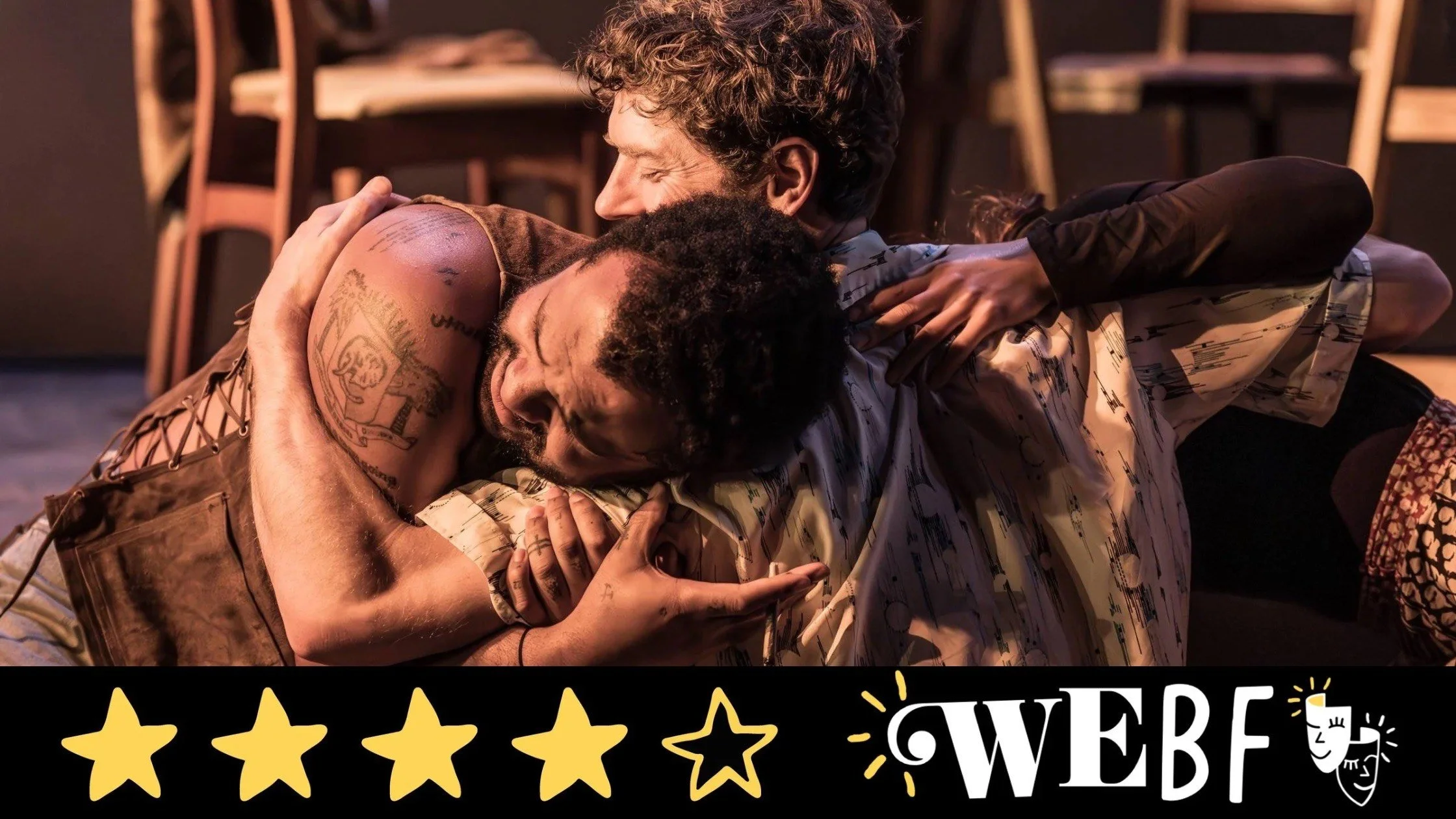Review: ROMANS: A NOVEL, Almeida Theatre
Photo credit: Marc Brenner
Alice Birch strikes again with her absurd masterpiece of loneliness in masculinity. Romans is a non-linear storytelling of the Roman brothers, Jake (Kyle Soller), Marlow (Oliver Johnstone), and Edmund (Stuart Thompson), experiencing loneliness through three parallel perspectives. Like the title suggests, Birch’s poetic writing makes you feel like you’re reading a novel. Spanning across time, the play explores how society expects men to behave from the 19th century to the present day.
What’s truly powerful about the piece is that we don’t just see how terrible these men feel internally, we see how their behaviours affect others. The play features multiple characters who appear in only one or two scenes, but each of them is given the space to tell the full story of their life. Behind the scenes, the residue of toxic masculinity is clear: colonisation, genocide, brainwashing, and more.
Birch seems to continue her ongoing themes of generational trauma and mental health. What’s interesting is that even though we explore the trauma that the men experienced in their childhoods, you never fully feel sorry for them, except in moments when they’re young, or in the case of Edmund, who’s considered the ‘failure’ of the family. It’s a true anti-hero story. Birch strikes a perfect balance between showing us why things happened the way they did, without romanticising the harm these men have caused to others.
Directed by Sam Pritchard, the three parallel stories come to life. This is an extremely difficult and ambitious play to direct, as it tries to tackle all the classic figures of toxic masculinity: from schoolboys to soldiers, cult leaders to podcasters. Pritchard does a beautiful job of telling a clear story for each brother in a montage-like, filmic way. Though this is a successful device at first, it does become tiring and repetitive. Some of the theatrical language doesn’t feel fully integrated into the story. For example, the use of camera projection feels like a trendy device in contemporary theatre, but we’d like to raise the question: if it doesn’t add to the storytelling, is it really necessary?
There also seems to be a concern around giving space to the women in the play. A microphone and spotlight are introduced to ‘give them a voice’, but we’d argue that this isn’t necessary. Like the other characters: people on the receiving end of genocide or colonisation, the women in romantic relationships with these men are also on the receiving end of the situation. Highlighting the female experience separately made the other receivers of violence feel less significant, even though they are all carrying the same weight of being on the receiving end of toxic masculinity. Besides, the writing itself is powerful enough for the audience to understand the impact of these situations.
The second act, however, is handled brilliantly. The absurdity and dark humour land well, and the merging of the three brothers’ parallel universes—breaking the walls between their stories—is effective and satisfying.
Each and every actor in this play is charming and energetic. The ensemble has wonderful chemistry. Soller, Johnstone, and Thompson each do an excellent job with subtle physical and psychological transformations, shifting between different ages of their characters without exaggerated gestures. It’s subtle yet clear. They each have their own presence, building a strong character arc.
Declan Cinoel, Yanexi Enriques, Oliver Huband, Jerry Killick, Adelle Leonce, and Agnes O’Casey are all brilliant in their multi-roling. Each of them is transformative, with immaculate timing. Enriques, in particular, stands out with her dark humour and comic timing.
Merle Hensel’s set and costume design is both minimal and maximal, fitting perfectly between the first and second acts. Having worked with the Almeida before, it’s clear he understands how to push the space to its full potential. However, some moments feel clunky, especially the mechanics of the backdrops. A more elegant solution might have helped smooth out some of these transitions. That said, it’s a fun and interactive set for the actors to play with. The costumes effectively show the passage through different eras, reinforcing Birch’s point that this is a timeless question. Lee Curran’s lighting brings us in and out of realism and absurdity, while Benjamin Grant and Jasmin Kent Rodman shape the atmosphere around us.
“Older men were less likely to state they are lonely, less likely to make deep social connections, and more reliant on wives/girlfriends, booze, and denial to tackle loneliness.” — Dr John Ratcliffe.
Male loneliness is not a widely discussed topic. Birch’s writing tackles this subject, but it doesn’t give men excuses for doing harmful things. It raises the question: Is loneliness what eventually causes many of them to act out violently? In a time when violence is happening across the world, we can’t help but wonder how we might turn our attention toward why so many men are generating harmful thoughts or behaviours, and how the deeply implanted ideas of so-called masculinity continue to play a part in this.
**** Four stars
Reviewed by: Diana Feng
Romans: A Novel plays at London’s Almeida Theatre until 11 October, with further info here.


